Pulmicort 200 Turbohaler
S0937 LEAFLET Pulmicort 20160620
3. HOW TO USE PULMICORT TURBOHALER
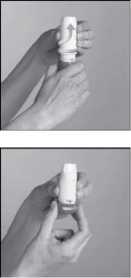
PACKAGE LEAFLET: INFORMATION FOR THE USER PULMICORT® 200 TURBOHALER® (budesonide)
Your medicine is known as Pulmicort 200 Turbohaler but will be referred to as Pulmicort Turbohaler throughout the following patient information leaflet.
Information for other strengths of Pulmicort Turbohaler may also be present in this leaflet.
Read all of this leaflet carefully before you start using this medicine because it contains important information for you.
• Keep this leaflet. You may need to read it again.
• If you have any further questions, ask your doctor or pharmacist.
• This medicine has been prescribed for you only. Do not pass it on to others. It may harm them, even if their signs of illness are the same as yours.
• If you get any side effects, talk to your doctor or pharmacist. This includes any possible side effects not listed in this leaflet. See section 4.
What is in this leaflet
1. What Pulmicort Turbohaler is and what it is used for
2. What you need to know before you use Pulmicort Turbohaler
3. How to use Pulmicort Turbohaler
4. Possible side effects
5. How to store Pulmicort Turbohaler
6. Contents of the pack and other information
1. WHAT PULMICORT TURBOHALER IS AND WHAT IT IS USED FOR
Pulmicort Turbohaler is an inhaler. It contains a medicine called budesonide. This belongs to a group of medicines called ‘corticosteroids'. It works by reducing and preventing swelling and inflammation in your lungs.
Your doctor has prescribed this medicine to treat asthma. Your doctor will prescribe two asthma inhalers: Pulmicort Turbohaler and a separate ‘reliever inhaler'.
• Use Pulmicort Turbohaler every day, as your doctor has told you to. This helps to prevent asthma symptoms from happening.
• Use your ‘reliever inhaler' when you get asthma symptoms, to make it easier to breathe again.
2. WHAT YOU NEED TO KNOW BEFORE YOU USE PULMICORT TURBOHALER
Do not use Pulmicort Turbohaler:
If you are allergic to budesonide.
Warnings and precautions
Talk to your doctor or pharmacist before using Pulmicort Turbohaler if:
• You have a lung infection.
• You have a cold or chest infection or any problems with your breathing.
• You have or have ever had tuberculosis (TB).
• You have liver problems.
Other medicines and Pulmicort Turbohaler
Tell your doctor or pharmacist if you are taking, have recently taken or might take any other medicines. This includes medicines that you buy without a prescription and herbal medicines. This is because Pulmicort Turbohaler can affect the way some medicines work and some medicines can have an effect on Pulmicort Turbohaler.
In particular, tell your doctor or pharmacist if you are taking any of the following medicines:
• Steroid medicines.
• Medicines to treat fungal infections (such as itraconazole and ketoconazole).
• HIV protease inhibitors (such as ritonavir and nelfinavir). Pregnancy, breast-feeding and fertility
• If you are pregnant or breast-feeding, think you may be pregnant or are planning to have a baby, ask your doctor or pharmacist for advice before using this medicine. Do not use Pulmicort Turbohaler unless your doctor tells you to.
• If you get pregnant while using Pulmicort Turbohaler, do not stop using Pulmicort Turbohaler but talk to your doctor immediately.
Driving and using machines
Pulmicort Turbohaler is not likely to affect you being able to drive or use any tools or machines.
Information you may have to carry while you are using Pulmicort Turbohaler
If you are using a high dose of Pulmicort Turbohaler your doctor may ask you to carry a steroid warning card. This explains to others about your medication.
• Always use this medicine exactly as your doctor or pharmacist has told you. Check with your doctor or pharmacist if you are not sure.
• If Pulmicort Turbohaler is to be used by your child, make sure they use it correctly as your doctor has told you.
• It is important to use Pulmicort Turbohaler every day, even if you have no asthma symptoms at the time.
• Your breathing may improve within 2 days. However it can take up to 4 weeks for the medicine to have its full effect.
Important information about your asthma symptoms
If you feel you are getting breathless or wheezy while using Pulmicort Turbohaler, you should continue to use Pulmicort Turbohaler but go to see your doctor as soon as possible, as you may need additional treatment.
Contact your doctor immediately if:
• Your breathing is getting worse or you often wake up at night with asthma.
• Your chest starts to feel tight in the morning or your chest tightness lasts longer than usual.
These signs could mean that your condition is not being properly controlled and you may need different or additional treatment immediately.
Use your Pulmicort Turbohaler every day.
This helps to prevent asthma symptoms from happening. Your doctor will advise you of the correct dose to treat your asthma. Your doctor will reduce your medication to the lowest dose needed to control your asthma.
If your doctor has told you to use your Turbohaler twice a day: Adults and children (13 years and above)
• The recommended dose is 1 or 2 inhalations, twice a day (in the morning and in the evening).
• Your doctor may increase this to a maximum of 1600 micrograms a day.
• If your asthma is getting worse and you are using your ‘reliever inhaler' more often or you have more symptoms:
- double your dose of Pulmicort Turbohaler immediately and talk to your doctor as soon as possible
- double your dose by taking twice as many inhalations each time.
Use in Children (5 - 12 years of age)
• The recommended dose is 1 or 2 inhalations, twice a day (in the morning and in the evening).
• The doctor may increase this to a maximum of 800 micrograms a day.
If your doctor has told you to use your Turbohaler once a day:
• Only use your Turbohaler once a day if your doctor has told you to.
• Use your Turbohaler at the same time each evening.
Adults and children (13 years and above)
• The recommended dose is 1 or 2 inhalations, in the evening.
• If your asthma is getting worse and you are using your ‘reliever inhaler' more often or you have more symptoms:
- double your dose immediately and talk to your doctor as soon as possible
- double your dose by taking the same number of inhalations your doctor has told you twice a day (once in the morning and once in the evening).
Use in Children (5 - 12 years of age)
• The recommended dose is 1 or 2 inhalations, in the evening.
• The maximum dose is 400 micrograms a day.
Use your separate ‘reliever inhaler’ to treat asthma symptoms when they happen.
Always keep your ‘reliever inhaler' with you to use when you need it. Do not use Pulmicort Turbohaler to treat asthma symptoms - use your ‘reliever inhaler'.
How to prepare a new Turbohaler for use
Before using Pulmicort Turbohaler for the first time you need to prepare the Turbohaler for use.
Unscrew the white cover and lift it off.
Hold your Turbohaler upright with brown base at the bottom. Do not hold the mouthpiece when you turn the grip. Turn the brown base as far as it will go in one direction. Then turn it back as far as it will go in the other direction. It does not matter which way you turn first. You should hear a click sound. Perform the procedure twice.
The Turbohaler is now ready for use, and you should not repeat the above procedure again. To take a dose, please follow the instructions below.
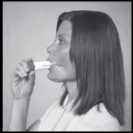
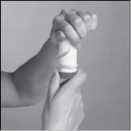
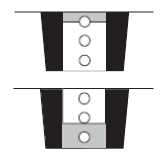
How to take an inhalation
Every time you need to take an inhalation, follow the instructions
below.
1. Unscrew the white cover and lift it off.
2. Hold your Turbohaler upright with the brown base at the bottom.
3. Do not hold the mouthpiece when you load your Turbohaler. To load your Turbohaler with a dose, turn the brown base as far as it will go in one direction. Then turn it as far as it will go in the other direction. It does not matter which way you turn it first. You should hear a click sound. Your Turbohaler is now loaded and ready to use. Only load your Turbohaler when you need to use it.
4. Hold your Turbohaler away from your mouth. Breathe out gently (as far as is comfortable). Do not breathe out through your Turbohaler.
5. Place the mouthpiece gently between your teeth. Close your lips. Breathe in as deeply and as hard as you can through your mouth. Do not chew or bite on the mouthpiece.
6. Remove your Turbohaler from your mouth. Then breathe out gently. The amount of medicine that is inhaled is very small. This means you may not be able to taste it after inhalation. If you have followed the instructions, you can still be confident that you have inhaled the dose and the medicine is now in your lungs.
7. If you are to take a second inhalation, repeat steps 2 to 6.
8. Replace the cover by screwing it back on tightly after use.
9. Rinse your mouth out with water after inhaling your prescribed dose.
Do not try to remove or twist the mouthpiece. It is fixed to your Turbohaler and must not be taken off. Do not use your Turbohaler if it has been damaged or if the mouthpiece has come apart from your Turbohaler.
Cleaning your Turbohaler
Wipe the outside of the mouthpiece once a week with a dry tissue. Do not use water or liquids.
When to start using a new Turbohaler
When you first see a red mark (depicted as grey) in the indicator window, there are about 20 doses left. You will then need to see your doctor for another prescription.
When the red mark has reached the bottom of the indicator window, you must start using your new Turbohaler.
Note:
• The brown base will still twist and ‘click' even when your Turbohaler is empty.
• The sound that you hear as you shake your Turbohaler is produced by a drying agent and not the medicine. Therefore the sound does not tell you how much medicine is left in your Turbohaler.
• If you load your Turbohaler more than once by mistake before taking your dose, you will still only receive one dose.
If you use more Pulmicort Turbohaler than you should
It is important that you take your dose as stated on the pharmacist's label or as advised by your doctor. You should not increase or decrease your dose without seeking medical advice. If you use more Pulmicort Turbohaler than you should, contact your doctor or pharmacist for advice.
If you forget to use Pulmicort Turbohaler
If you forget to take a dose, skip the missed dose and take the next dose as usual. Do not take a double dose to make up for a forgotten dose.
If you stop using Pulmicort Turbohaler
Do not stop using this medicine even when your asthma gets better, unless your doctor tells you to.
If you have any further questions on the use of this medicine, ask your doctor or pharmacist.
4. POSSIBLE SIDE EFFECTS
Like all medicines, this medicine can cause side effects, although not everybody gets them.
If either of the following happen to you, stop using Pulmicort Turbohaler and talk to your doctor immediately:
• Swelling of your face, particularly around your mouth (with possible swelling of the lips, tongue, eyes and ears), rash, itching, contact dermatitis (a skin problem), hives and bronchospasm (tightening of the muscles in the airways which causes wheezing). This may mean that you are having an allergic reaction. This happens rarely, affecting less than 1 in 1,000 people.
• Sudden wheezing after inhaling your medicine. If this happens, also use your ‘reliever' inhaler straight away. This happens very rarely, affecting less than 1 in 10,000 people.
• Thrush (a fungal infection) in the mouth. This is less likely if you rinse your mouth out with water after using your Turbohaler.
• Mild sore throat, coughing and a hoarse voice.
Rare (may affect up to 1 in 1,000 people)
• Sleeping problems, depression or feeling worried, restless, nervous, over-excited or irritable. These effects are more likely to occur in children.
• Bruising of the skin.
• Loss of voice.
• Hoarse voice (in children).
Inhaled corticosteroids can affect the normal production of steroid hormones in your body, particularly if you use high doses for a long time, for example 400 micrograms or more daily for several years. The effects include:
• changes in bone mineral density (thinning of the bones).
• cataract (clouding of the lens in the eye).
• glaucoma (increased pressure in the eye)
• a slowing of the rate of growth of children and adolescents (rare). If high doses are given over several years, final adult height may be reduced by about 1 cm.
• an effect on the adrenal gland (a small gland next to the kidney) (rare).
These effects are much less likely to happen with inhaled corticosteroids than with corticosteroid tablets.
Reporting of side effects
If you get any side effects, talk to your doctor or pharmacist. This includes any possible side effects not listed in this leaflet. You can also report side effects directly via the Yellow Card Scheme at: www.mhra.gov.uk/yellowcard. By reporting side effects you can help provide more information on the safety of this medicine.
5. HOW TO STORE PULMICORT TURBOHALER
• KEEP OUT OF THE SIGHT AND REACH OF CHILDREN.
• Do not use after the expiry date printed on the pack.
• Pulmicort Turbohaler should be stored below 30°C. Replace the cover properly after use.
• If your doctor tells you to stop using the medicine, please take it back to the pharmacist for safe disposal. Only keep the medicine if your doctor tells you to.
• If your Pulmicort Turbohaler is not working properly or shows any other signs of deterioration, you should seek the advice of your pharmacist who will tell you what to do.
• Medicines should not be disposed of via wastewater or household waste. Ask your pharmacist how to dispose of medicines that are no longer required. This will help to protect the environment.
6. CONTENTS OF THE PACK AND OTHER INFORMATION
What Pulmicort Turbohaler contains
• Pulmicort Turbohaler contains 100 actuations each delivering 200 micrograms of the active ingredient budesonide. There are no other ingredients.
What Pulmicort Turbohaler looks like and contents of the pack
Pulmicort Turbohaler is a breath actuated metered dose powder inhaler with a white cap and a dark brown base and turning grip. A braille code for the identification of Pulmicort Turbohaler and ‘Budesonide 200' are embossed on the bottom of the turning grip.
Product Licence holder
Procured from within the EU and repackaged by the Product Licence holder: S&M Medical Ltd, Chemilines House, Alperton Lane, Wembley, HA0 1DX.
Manufacturer
This product is manufactured by AstraZeneca AB, S-15185 Sodertalje, Sweden.
| POM | PL: 19488/0937
Leaflet revision date: 20 June 2016
Pulmicort® and Turbohaler® are registered trade mark of AstraZeneca AB, Sweden.
S0937 LEAFLET Pulmicort 20160620
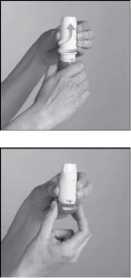
PACKAGE LEAFLET: INFORMATION FOR THE USER BUDESONIDE 200 micrograms DRY POWDER INHALER (budesonide)
Your medicine is known as Budesonide 200 micrograms Dry Powder Inhaler but will be referred to as Budesonide Inhaler throughout the following patient information leaflet.
Information for other strengths of Budesonide Inhaler may also be present in this leaflet.
Read all of this leaflet carefully before you start using this medicine because it contains important information for you.
• Keep this leaflet. You may need to read it again.
• If you have any further questions, ask your doctor or pharmacist.
• This medicine has been prescribed for you only. Do not pass it on to others. It may harm them, even if their signs of illness are the same as yours.
• If you get any side effects, talk to your doctor or pharmacist. This includes any possible side effects not listed in this leaflet. See section 4.
What is in this leaflet
1. What Budesonide Inhaler is and what it is used for
2. What you need to know before you use Budesonide Inhaler
3. How to use Budesonide Inhaler
4. Possible side effects
5. How to store Budesonide Inhaler
6. Contents of the pack and other information
1. WHAT BUDESONIDE INHALER IS AND WHAT IT IS USED FOR
Budesonide Inhaler is an inhaler. It contains a medicine called budesonide. This belongs to a group of medicines called ‘corticosteroids'. It works by reducing and preventing swelling and inflammation in your lungs.
Your doctor has prescribed this medicine to treat asthma. Your doctor will prescribe two asthma inhalers: Budesonide Inhaler and a separate ‘reliever inhaler'.
• Use Budesonide Inhaler every day, as your doctor has told you to. This helps to prevent asthma symptoms from happening.
• Use your ‘reliever inhaler' when you get asthma symptoms, to make it easier to breathe again.
2. WHAT YOU NEED TO KNOW BEFORE YOU USE BUDESONIDE INHALER
Do not use Budesonide Inhaler:
If you are allergic to budesonide.
Warnings and precautions
Talk to your doctor or pharmacist before using Budesonide Inhaler if:
• You have a lung infection.
• You have a cold or chest infection or any problems with your breathing.
• You have or have ever had tuberculosis (TB).
• You have liver problems.
Other medicines and Budesonide Inhaler
Tell your doctor or pharmacist if you are taking, have recently taken or might take any other medicines. This includes medicines that you buy without a prescription and herbal medicines. This is because Budesonide Inhaler can affect the way some medicines work and some medicines can have an effect on Budesonide Inhaler.
In particular, tell your doctor or pharmacist if you are taking any of the following medicines:
• Steroid medicines.
• Medicines to treat fungal infections (such as itraconazole and ketoconazole).
• HIV protease inhibitors (such as ritonavir and nelfinavir). Pregnancy, breast-feeding and fertility
• If you are pregnant or breast-feeding, think you may be pregnant or are planning to have a baby, ask your doctor or pharmacist for advice before using this medicine. Do not use Budesonide Inhaler unless your doctor tells you to.
• If you get pregnant while using Budesonide Inhaler, do not stop using Budesonide Inhaler but talk to your doctor immediately.
Driving and using machines
Budesonide Inhaler is not likely to affect you being able to drive or use any tools or machines.
Information you may have to carry while you are using Budesonide Inhaler
If you are using a high dose of Budesonide Inhaler your doctor may ask you to carry a steroid warning card. This explains to others about your medication.
• Always use this medicine exactly as your doctor or pharmacist has told you. Check with your doctor or pharmacist if you are not sure.
• If Budesonide Inhaler is to be used by your child, make sure they use it correctly as your doctor has told you.
• It is important to use Budesonide Inhaler every day, even if you have no asthma symptoms at the time.
• Your breathing may improve within 2 days. However it can take up to 4 weeks for the medicine to have its full effect.
Important information about your asthma symptoms
If you feel you are getting breathless or wheezy while using Budesonide Inhaler, you should continue to use Budesonide Inhaler but go to see your doctor as soon as possible, as you may need additional treatment.
Contact your doctor immediately if:
• Your breathing is getting worse or you often wake up at night with asthma.
• Your chest starts to feel tight in the morning or your chest tightness lasts longer than usual.
These signs could mean that your condition is not being properly controlled and you may need different or additional treatment immediately.
Use your Budesonide Inhaler every day.
This helps to prevent asthma symptoms from happening. Your doctor will advise you of the correct dose to treat your asthma. Your doctor will reduce your medication to the lowest dose needed to control your asthma.
If your doctor has told you to use your Inhaler twice a day: Adults and children (13 years and above)
• The recommended dose is 1 or 2 inhalations, twice a day (in the morning and in the evening).
• Your doctor may increase this to a maximum of 1600 micrograms a day.
• If your asthma is getting worse and you are using your ‘reliever inhaler' more often or you have more symptoms:
- double your dose of Budesonide Inhaler immediately and talk to your doctor as soon as possible
- double your dose by taking twice as many inhalations each time.
Use in Children (5 - 12 years of age)
• The recommended dose is 1 or 2 inhalations, twice a day (in the morning and in the evening).
• The doctor may increase this to a maximum of 800 micrograms a day.
If your doctor has told you to use your Inhaler once a day:
• Only use your Inhaler once a day if your doctor has told you to.
• Use your Inhaler at the same time each evening.
Adults and children (13 years and above)
• The recommended dose is 1 or 2 inhalations, in the evening.
• If your asthma is getting worse and you are using your ‘reliever inhaler' more often or you have more symptoms:
- double your dose immediately and talk to your doctor as soon as possible
- double your dose by taking the same number of inhalations your doctor has told you twice a day (once in the morning and once in the evening).
Use in Children (5 - 12 years of age)
• The recommended dose is 1 or 2 inhalations, in the evening.
• The maximum dose is 400 micrograms a day.
Use your separate ‘reliever inhaler’ to treat asthma symptoms when they happen.
Always keep your ‘reliever inhaler' with you to use when you need it. Do not use Budesonide Inhaler to treat asthma symptoms - use your ‘reliever inhaler'.
How to prepare a new Inhaler for use
Before using Budesonide Inhaler for the first time you need to prepare the Inhaler for use.
Unscrew the white cover and lift it off.
Hold your Inhaler upright with brown base at the bottom. Do not hold the mouthpiece when you turn the grip. Turn the brown base as far as it will go in one direction. Then turn it back as far as it will go in the other direction. It does not matter which way you turn first. You should hear a click sound.
Perform the procedure twice.
The Inhaler is now ready for use, and you should not repeat the above procedure again. To take a dose, please follow the instructions below.
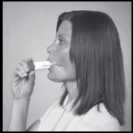
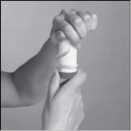
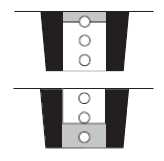
How to take an inhalation
Every time you need to take an inhalation, follow the instructions
below.
1. Unscrew the white cover and lift it off.
2. Hold your Inhaler upright with the brown base at the bottom.
3. Do not hold the mouthpiece when you load your Inhaler. To load your Inhaler with a dose, turn the brown base as far as it will go in one direction. Then turn it as far as it will go in the other direction. It does not matter which way you turn it first. You should hear a click sound. Your Inhaler is now loaded and ready to use. Only load your Inhaler when you need to use it.
4. Hold your Inhaler away from your mouth. Breathe out gently (as far as is comfortable). Do not breathe out through your Inhaler.
5. Place the mouthpiece gently between your teeth. Close your lips. Breathe in as deeply and as hard as you can through your mouth. Do not chew or bite on the mouthpiece.
6. Remove your Inhaler from your mouth.
Then breathe out gently. The amount of medicine that is inhaled is very small. This means you may not be able to taste it after inhalation. If you have followed the instructions, you can still be confident that you have inhaled the dose and the medicine is now in your lungs.
7. If you are to take a second inhalation, repeat steps 2 to 6.
8. Replace the cover by screwing it back on tightly after use.
9. Rinse your mouth out with water after inhaling your prescribed dose.
Do not try to remove or twist the mouthpiece.
It is fixed to your Inhaler and must not be taken off. Do not use your Inhaler if it has been damaged or if the mouthpiece has come apart from your Inhaler.
Cleaning your Inhaler
Wipe the outside of the mouthpiece once a week with a dry tissue. Do not use water or liquids.
When to start using a new Inhaler
When you first see a red mark (depicted as grey) in the indicator window, there are about 20 doses left. You will then need to see your doctor for another prescription.
When the red mark has reached the bottom of the indicator window, you must start using your new Inhaler.
Note:
• The brown base will still twist and ‘click' even when your Inhaler is empty.
• The sound that you hear as you shake your Inhaler is produced by a drying agent and not the medicine. Therefore the sound does not tell you how much medicine is left in your Inhaler.
• If you load your Inhaler more than once by mistake before taking your dose, you will still only receive one dose.
If you use more Budesonide Inhaler than you should
It is important that you take your dose as stated on the pharmacist's label or as advised by your doctor. You should not increase or decrease your dose without seeking medical advice. If you use more Budesonide Inhaler than you should, contact your doctor or pharmacist for advice.
If you forget to use Budesonide Inhaler
If you forget to take a dose, skip the missed dose and take the next dose as usual. Do not take a double dose to make up for a forgotten dose.
If you stop using Budesonide Inhaler
Do not stop using this medicine even when your asthma gets better, unless your doctor tells you to.
If you have any further questions on the use of this medicine, ask your doctor or pharmacist.
4. POSSIBLE SIDE EFFECTS
Like all medicines this medicine can cause side effects, although not everybody gets them.
If either of the following happen to you, stop using Budesonide Inhaler and talk to your doctor immediately:
• Swelling of your face, particularly around your mouth (with possible swelling of the lips, tongue, eyes and ears), rash, itching, contact dermatitis (a skin problem), hives and bronchospasm (tightening of the muscles in the airways which causes wheezing). This may mean that you are having an allergic reaction. This happens rarely, affecting less than 1 in 1,000 people.
• Sudden wheezing after inhaling your medicine. If this happens, also use your ‘reliever' inhaler straight away. This happens very rarely, affecting less than 1 in 10,000 people.
• Thrush (a fungal infection) in the mouth. This is less likely if you rinse your mouth out with water after using your Inhaler.
• Mild sore throat, coughing and a hoarse voice.
Rare (may affect up to 1 in 1,000 people)
• Sleeping problems, depression or feeling worried, restless, nervous, over-excited or irritable. These effects are more likely to occur in children.
• Bruising of the skin.
• Loss of voice.
• Hoarse voice (in children).
Inhaled corticosteroids can affect the normal production of steroid hormones in your body, particularly if you use high doses for a long time, for example 400 micrograms or more daily for several years. The effects include:
• changes in bone mineral density (thinning of the bones).
• cataract (clouding of the lens in the eye).
• glaucoma (increased pressure in the eye)
• a slowing of the rate of growth of children and adolescents (rare). If high doses are given over several years, final adult height may be reduced by about 1 cm.
• an effect on the adrenal gland (a small gland next to the kidney) (rare).
These effects are much less likely to happen with inhaled corticosteroids than with corticosteroid tablets.
Reporting of side effects
If you get any side effects, talk to your doctor or pharmacist. This includes any possible side effects not listed in this leaflet. You can also report side effects directly via the Yellow Card Scheme at: www.mhra.gov.uk/yellowcard. By reporting side effects you can help provide more information on the safety of this medicine.
5. HOW TO STORE BUDESONIDE INHALER
• KEEP OUT OF THE SIGHT AND REACH OF CHILDREN.
• Do not use after the expiry date printed on the pack.
• Budesonide Inhaler should be stored below 30°C. Replace the cover properly after use.
• If your doctor tells you to stop using the medicine, please take it back to the pharmacist for safe disposal. Only keep the medicine if your doctor tells you to.
• If your Budesonide Inhaler is not working properly or shows any other signs of deterioration, you should seek the advice of your pharmacist who will tell you what to do.
• Medicines should not be disposed of via wastewater or household waste. Ask your pharmacist how to dispose of medicines that are no longer required. This will help to protect the environment.
6. CONTENTS OF THE PACK AND OTHER INFORMATION
What Budesonide Inhaler contains
• Budesonide Inhaler contains 100 actuations each delivering 200 micrograms of the active ingredient budesonide. There are no other ingredients.
What Budesonide Inhaler looks like and contents of the pack
Budesonide Inhaler is a breath actuated metered dose powder inhaler with a white cap and a dark brown base and turning grip. A braille code for the identification of Budesonide Inhaler and ‘Budesonide 200' are embossed on the bottom of the turning grip.
Product Licence holder
Procured from within the EU and repackaged by the Product Licence holder: S&M Medical Ltd, Chemilines House, Alperton Lane, Wembley, HA0 1DX.
Manufacturer
This product is manufactured by AstraZeneca AB, S-15185 Sodertalje, Sweden.
| POM | PL: 19488/0937 Leaflet revision date: 20 June 2016
S0937 LEAFLET Budesonide 20160620